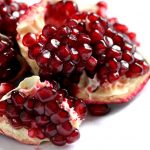The Rosh HaShanah seder
 On Rosh HaShanah evening many people put an array of simanim, symbolic foods, on the table – not just apple and honey but other foods too, which are tasted one by one as their meaning is explained.
On Rosh HaShanah evening many people put an array of simanim, symbolic foods, on the table – not just apple and honey but other foods too, which are tasted one by one as their meaning is explained.
The apple and honey signify our prayer for a sweet year. There are also dates, leeks, carrots, beets, pomegranates, beans, apples, and a fish head. If you haven’t recently eaten one of these foods and require a Shehecheyanu, it is covered by the Shehecheyanu in the Kiddush.
Each food has its explanatory words; the pomegranate (rimmon), for example, expresses the hope that just as the fruit is filled with seeds, so the year will be filled with mitzvot. The beet (selek) suggests the hope that any unhappiness will depart (yistalek).
There are many customs as to the order of the foods. What we share is our yearning that the year ahead will bring us only good things.
The question is whether we deserve everything we seek. That’s what lies behind the last line of Avinu Malkenu, “Our Father, our King, be gracious to us and answer us, for we have no good deeds”.
An old custom was to say these words quietly and hesitantly, because we asked for so much and lacked good deeds to pay for it.
These days we sing this line loudly and confidently to assure God that this year He can rely on us because we plan to accumulate good deeds.



